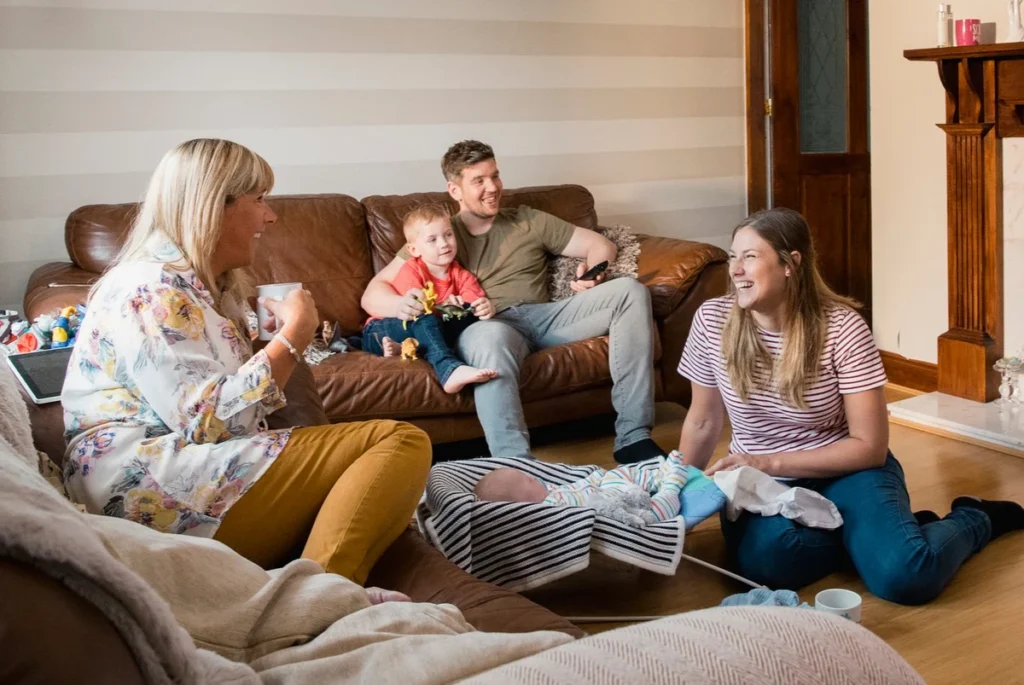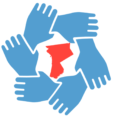
Bringing home a baby is like hosting the biggest event of your life, except you’re exhausted, recovering from childbirth, and covered in spit-up. Meanwhile, your friends, in-laws, and that one coworker you barely talk to suddenly can’t wait to see you.
While visitors mean well, setting boundaries and expectations is crucial for your sanity, your baby’s health, and keeping your relationships intact. Let’s dive into the do’s and don’ts of newborn visitors, when it’s appropriate to visit, and how to say “not today” without sounding like a villain.
Why Setting Visitor Boundaries is Essential
- Your Baby’s Immune System is Delicate
- Newborns have weak immune systems, making them vulnerable to colds, flu, RSV, and other germs.
- Too many visitors = too many germs.
- Mom and Baby Need Recovery Time
- Whether vaginal birth or C-section, your body is healing.
- Constant visitors = Less time to rest, bond, and recover.
- Breastfeeding & Bonding are Priority
- You don’t need an audience while figuring out breastfeeding (which is not as “natural” as people claim).
- Babies bond best with parents first—too much passing around can be overwhelming.
- Mental Health Matters
- Baby blues, postpartum anxiety, and exhaustion are real.
- Unwanted guests = Unnecessary stress.
Reality Check: Your home isn’t a baby museum—you don’t owe anyone a front-row ticket to the newborn show.
When is it Safe to Have Visitors?
First 1-2 Weeks: Immediate family only (if healthy).
Weeks 2-6: Close friends & relatives who follow hygiene rules.
Cold/Flu Season: Delay visits or require masks/sanitizing.
Anytime: If parents feel overwhelmed, it’s okay to pause visitors altogether!
Signs Someone Should NOT Visit
They’re sick (even “just a sniffle”) – RSV and flu can be deadly for newborns.
They refuse to wash hands or sanitize.
They don’t respect your baby’s sleep schedule.
They smoked recently (smoke lingers on clothes).
Do’s & Don’ts for Visitors
DO: Follow These Golden Rules
1. Always Ask Before Visiting
- No “surprise” pop-ins!
- Text or call first. New parents might be napping, feeding, or crying in the shower.
2. Keep Your Visit Short
- 30-45 minutes MAX (unless the parents invite you to stay longer).
- New parents are too polite to kick you out—don’t overstay!
3. Wash Hands Before Holding the Baby
- Babies touch their faces constantly—germs spread FAST.
- Use soap and water or hand sanitizer at the door.
4. Offer to Help (Not Just Hold the Baby!)
- Best visitor move? Fold laundry, bring food, or clean dishes.
- Worst move? Sitting there while exhausted parents entertain you.
5. Respect the Baby’s Sleep
- DO NOT WAKE A SLEEPING BABY.
- If the baby is asleep when you arrive, admire from a distance or visit another time.
6. Bring Food, Not Expectations
- The best gift: A warm meal (or their favorite coffee).
- The worst gift: Expecting the new parents to entertain you.
7. Be Okay with a “Not Today”
- If parents say, “We’re too tired for visitors,” respect that.
- Don’t take it personally—it’s not about you, it’s about survival!
DON’T: Avoid These Visitor Fails
1. Don’t Kiss the Baby
- No exceptions. Cold sores, RSV, and flu can be life-threatening for newborns.
2. Don’t Visit if You’re Sick
- Even if it’s “just allergies”—stay home!
3. Don’t Overload New Parents with Advice
- If they ask, share. If not, zip it. No one wants a lecture on cloth diapers vs. disposables on day 3 of no sleep.
4. Don’t Expect to Hold the Baby Immediately
- Some parents prefer less handling—respect that.
5. Don’t Post Baby Photos Without Permission
- Social media rules: Ask before posting! Some parents are privacy-conscious.
6. Don’t Bring Young Kids Unless Invited
- Toddlers = Germ factories. If you must bring them, make sure they’re 100% healthy.
How to Hold a Newborn (Without Freaking Out!)
Newborns look fragile, but you won’t break them (if you follow these steps).
Wash Your Hands First. Always.
Support the Head & Neck. Their little necks aren’t strong yet.
Hold Them Securely, But Gently.
Avoid Jiggling, Rough Play, or Sudden Movements.
Hand Baby Back if They Cry. Parents know best how to soothe them.
New Parent Pro Tip: If someone holds your baby wrong, gently say:
“Let me show you how we’re comfortable with them being held.”
How to Politely Set Boundaries
For Close Family & Friends:
“We’re excited for you to meet baby! We’re limiting visitors for the first two weeks while we adjust.”
For Uninvited Guests:
“We’re resting right now—let’s set up a visit next week instead.”
For Long-Winded Guests:
“It’s been so great seeing you! We’re going to rest now, but let’s catch up soon.” (Code for: Please leave.)
For Anyone Who’s Sick:
“We’d love to see you when you’re feeling 100%! Baby’s immune system is still developing.”
Final Thoughts: You’re the Boss!
Setting boundaries isn’t mean—it’s necessary. Your newborn isn’t a community project, and your recovery should be priority #1.
Key Takeaways:
Set visitor rules early (so no one is surprised).
Your baby, your rules. If someone doesn’t respect them, they don’t get to visit.
Don’t be afraid to say NO. You don’t owe anyone time when you’re adjusting to a newborn.
Sources & Further Reading
- Babies & Bumps – Setting Boundaries in the Postpartum Period
- Centers for Disease Control (CDC) – Newborn Health & Visitor Guidelines
- La Leche League International – Breastfeeding and Newborn Bonding
- American Academy of Pediatrics (AAP) – Protecting Newborns from Illness
Newborn life is tough, but setting boundaries makes it easier. Stand your ground, protect your peace, and enjoy those baby snuggles!
Video Resources:
English:
Spanish:
Community Resources:
PARENTING SUPPORT & EDUCATION
1. Open Door Family Medical Center – Family Support Services
- Locations: Ossining, Sleepy Hollow, Mount Kisco, Port Chester, Brewster
- Services: New parent support, behavioral health counseling, group workshops
- Phone: (914) 941-1263
- Website: www.opendoormedical.org
2. Westchester Jewish Community Services (WJCS) – Parent-Child Programs
- Location: White Plains, NY (plus satellite offices)
- Services: New parent counseling, parent support groups, stress management
- Phone: (914) 761-0600
- Website: www.wjcs.com
3. Mental Health Association of Westchester – Maternal Mental Health Services
- Location: Tarrytown, NY
- Services: Support for postpartum adjustment, setting personal boundaries, managing anxiety
- Phone: (914) 345-5900
- Website: www.mhawestchester.org
COMMUNICATION & FAMILY COUNSELING RESOURCES
4. Family Services of Westchester (FSW) – Parent Coaching & Counseling
- Location: White Plains and Yonkers, NY
- Services: Conflict resolution, parent coaching, family therapy
- Phone: (914) 937-2320
- Website: www.fsw.org
5. Putnam County Mental Health Services – Parenting and Family Support
- Location: Carmel, NY
- Services: Individual and group counseling, postpartum support, healthy relationships
- Phone: (845) 808-1600
- Website: www.putnamcountyny.com
NEW PARENT GROUPS & ONLINE SUPPORT
6. The Guidance Center of Westchester – Early Childhood & Family Services
- Location: New Rochelle, NY
- Services: Parenting education, boundary-setting skills, maternal wellness support
- Phone: (914) 613-0700
- Website: www.theguidancecenter.org
7. Westchester Library System – Parent & Baby Meetups (Various Branches)
- Location: Multiple branches across Westchester
- Services: Storytimes, new parent groups, setting healthy boundaries in family life workshops
- Phone: (914) 231-3227
- Website: www.westchesterlibraries.org
8. United Way’s 211 Hudson Valley Helpline
- Coverage Area: Westchester and Putnam Counties
- Services: Referrals to parenting classes, counseling, maternal wellness groups
- Phone: 2-1-1 or 1-800-899-1479
- Website: www.hudson211.org
Legal Disclaimer: The information provided by our nonprofit is for informational purposes only and not a substitute for professional medical advice, diagnosis, or treatment. Always consult a qualified healthcare provider for medical concerns. We make no guarantees about the accuracy or completeness of the information and are not liable for any decisions made based on it. If you have a medical emergency, call 911 or seek immediate medical care.


